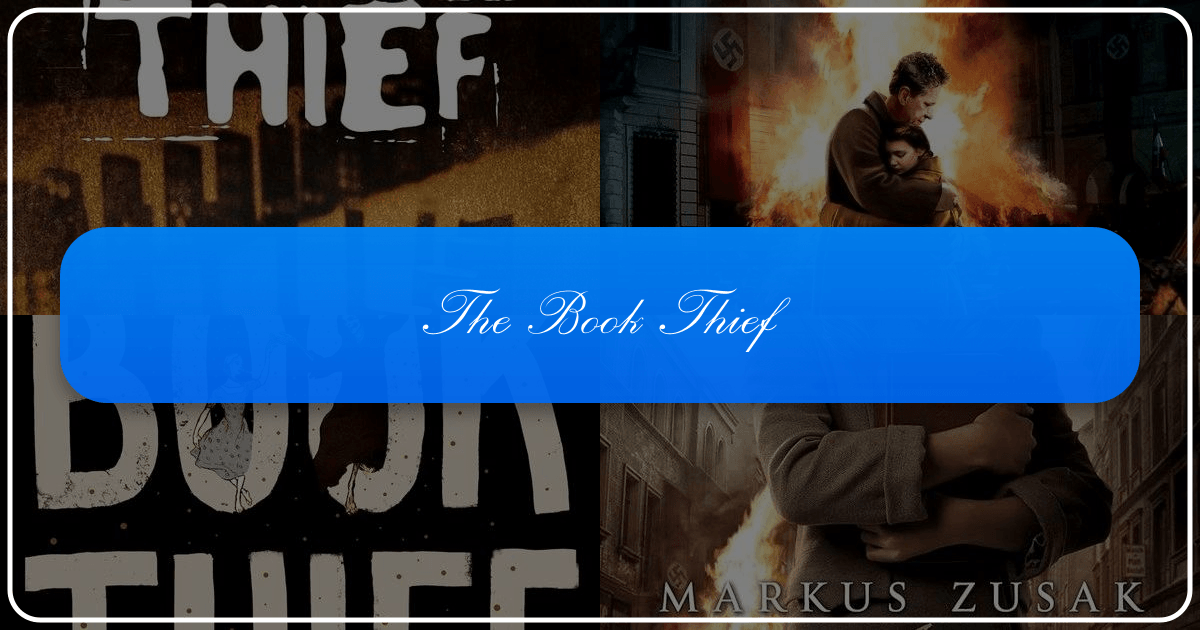The Book Thief: A Comprehensive Review

Markus Zusak’s “The Book Thief” is more than just a novel; it’s a poignant exploration of humanity’s resilience in the face of unimaginable suffering. Set against the backdrop of Nazi Germany during World War II, the story transcends the historical context, delving into universal themes of love, loss, the power of words, and the enduring human spirit. This review will examine the novel through several lenses, exploring its genre, literary merit, and lasting cultural impact, drawing on common website topic headings.

Genre and Literary Style
“The Book Thief” defies easy categorization. While often classified as historical fiction or young adult fiction, its unique narrative structure and thematic depth elevate it beyond simple genre conventions. The novel’s most striking feature is its unconventional narrator: Death himself. This perspective offers a detached yet deeply empathetic view of the human condition, allowing Zusak to explore the complexities of morality and the devastating impact of war without resorting to sentimentality. Death’s narration, often interspersed with darkly humorous and insightful commentary, creates a unique tone, balancing tragedy with a subtle, almost whimsical, lightness. This unexpected blend of humor and sorrow keeps the reader engaged while simultaneously prompting reflection on the profound themes presented. The novel is written in a clear, accessible style that avoids unnecessary complexities, making it engaging for a wide range of readers while the depth of characterization and sophisticated use of metaphor and symbolism appeal to more mature audiences. The book is a blend of realism and magical realism. It creates an intimate, emotionally charged atmosphere.

Plot Summary and Educational Value
The story centers on Liesel Meminger, a young girl sent to live with foster parents outside Munich after the death of her brother and the subsequent removal of her parents. Liesel’s life, marked by poverty and the looming threat of war, takes an unexpected turn when she discovers a love of books, and begins stealing them. Her stolen treasures, read to her by her kind foster father, Hans Hubermann, become a source of comfort and escape. The Hubermanns also hide Max Vandenburg, a Jewish man, in their basement. Liesel’s compassion and bravery, and the warmth of the relationships she forges—with her foster family, her friend Rudy, and Max—form the heart of the novel.

The novel provides substantial educational value on several levels. It offers a powerful and intimate glimpse into life in Nazi Germany, showcasing both the brutality of the regime and the quiet acts of resistance and human kindness that occurred amidst the chaos. “The Book Thief” effectively conveys the insidious nature of propaganda and the importance of critical thinking and independent thought, making it a valuable resource for exploring historical contexts. It also serves as a study in character development. The characters are portrayed realistically, with their flaws and strengths, making them relatable and memorable. Their experiences highlight the importance of compassion, empathy, and the transformative power of human connection. The novel is well-suited to discussions on empathy and the impact of the holocaust on civilians.
Life Lessons and Reading Habits
At its core, “The Book Thief” explores profound questions about life and death, love and loss, and the enduring power of human connection. The novel emphasizes the importance of empathy and compassion, highlighting the resilience of the human spirit even in the darkest of times. Liesel’s actions, both her stealing of books and her kindness to Max, represent small acts of rebellion against the prevailing darkness and highlight the transformative effect of books. Through her experiences, and the unique lens of the narrative, the novel promotes the significance of stories and their capacity to offer hope, comfort, and resilience in the face of adversity. The power of words and reading itself is a pivotal theme; the books Liesel steals save lives, offer solace, and are acts of defiance against the hateful ideologies of Nazism.
The novel could inspire readers to engage more deeply with literature. The book is a tribute to the power of reading and stories to comfort and create hope in tough times. Death’s commentary on storytelling demonstrates his capacity for compassion. The book explores the dangers of propaganda and the importance of empathy and compassion. Its blend of realism and magical realism is unique and engaging.
Cultural Impact and Adaptations
“The Book Thief” has garnered significant critical acclaim and popular success, translating into multiple languages and achieving considerable commercial success. Its exploration of the Holocaust and the human condition has made it a compelling piece of literature relevant to modern society. The novel’s profound impact on readers is undeniable. The book has sparked discussion about various facets of the holocaust and prompted readers to re-examine their own ideas about empathy, understanding, and resilience.
The novel’s success has led to various adaptations, most notably the 2013 film adaptation. While adaptations can provide a broader audience for the story, they often necessitate compromises. The film captures several of the novel’s emotional weight, but certain aspects, such as Death’s unique narrative voice and the subtle nuances of the characters, may be lost or altered in the transition to a different medium. The novel’s literary depth and thematic complexity may necessitate a deeper exploration beyond the visual medium. Film and other adaptations might serve as an entry point for readers to explore the themes and complexities of the novel in greater detail.
Conclusion
“The Book Thief” stands as a testament to the power of storytelling and the enduring human spirit. Through its unique narrative voice, compelling characters, and profound themes, it continues to resonate with readers of all ages and backgrounds. Its lasting impact on literature and popular culture is undeniable, prompting reflection on the importance of empathy, resilience, and the transformative power of words. The blend of genres, the depth of characterization, the unique narration, and the exploration of universal themes of life, death, love and loss make this book a compelling and important read.